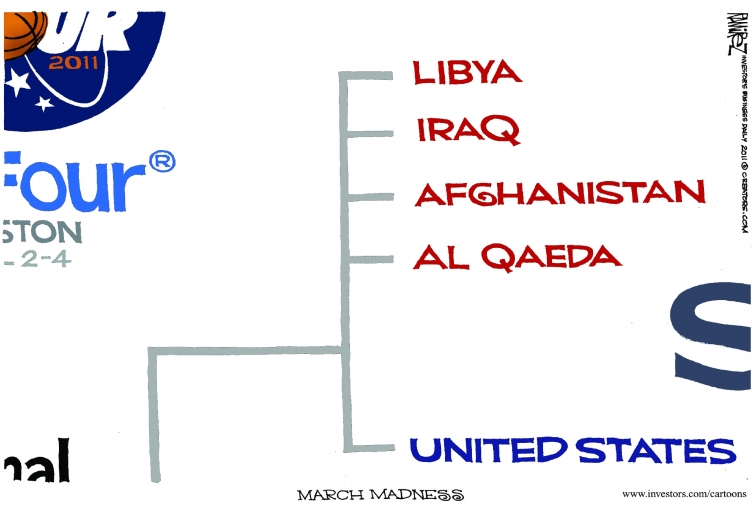There is much to commend, and there are some things to question, about Rand Paul’s big foreign policy speech yesterday at Heritage Foundation. The overall idea of using George Kennan-like “containment” for Iran or for jihadist Islam in general is, well, problematic , although there are plenty of elements of his speech that are at least somewhat sensible. It is a good thing to have discussion of such issues, and there is much value in having people make a thoughtful case against over-eagerness for military intervention. Those of us who tend a little more towards interventionism (“tend” being the key word, rather than “strongly favor”) do need to be challenged about the dangers of using military force.
Nonetheless, a fuller discussion of Paul’s speech would require more space and time than is available for me this morning. One paragraph, however, was so tendentious, so … well, civility requires that I withhold the most accurate words… anyway, so wrong as to demand response.
Here’s the passage at issue:
In the 1980s, the war caucus in Congress armed bin Laden and the mujaheddin in their fight with the Soviet Union. In fact, it was the official position of the State Department to support radical jihad against the Soviets. We all know how well that worked out.
Let’s leave aside for now the insulting, utterly asinine, sickening, inexcusable use of the phrase “war caucus” to describe those (including Reagan!) who supported the mujaheddin against the Soviets. That word choice alone is almost entirely disqualifying for its purveyor to ever be president.
Instead, let’s just look at a little history here — because the ignorance evident in this paragraph is truly astonishing. One would be hard pressed to find even a single historian, whether right, left, or center, who would argue anything other than that the Soviet failure in Afghanistan was not just a huge factor, but probably an essential one, in the Soviets’ ultimate loss of the Cold War. The mujaheddin did much to help bleed the Soviets dry, at a comparatively negligible cost to the United States (for smuggled military hardware and some intelligence). “We all know how well that worked out,” said Sen. Paul, dismissively, of the work of our “war caucus” to support the mujaheddin. Yes, we do: It played a key role in helping us win the Cold War. Anybody who doesn’t understand that is either foolish or invincibly ignorant.
Second, it is a myth that the United States “armed bin Laden.” False, false, false. It is also a falsehood to say that bin Laden was a major player within the mujeheddin or in the anti-Soviet war effort at all. Finally, it is false even to say that the Afghani effort against the Soviets was primarily, or even largely, about “jihad.” It was a defensive effort against armed invaders, not an offensive effort by “radicals” in the name of Allah. Sure, there were religious aspects to the motivations of the mujaheddin, who of course considered the Soviets to be “infidels,” but to say that the primary goal was to expand the reach of the Prophet is so absurd as to be laughable. The Afghani defense against the Soviets was, in truth, as close to being a nationalist, patriotic war as the diverse tribes of Afghanistan are ever likely to be involved in.
So every element of Sen. Paul’s paragraph was wrong: 1) Reagan was not the head of a “war caucus.” 2) The U.S. did not arm bin Laden. 3) The U.S. support had nothing to do with “radical jihad.” 4) The Afghani/mujaheddin effort as a whole was only tangentially jihadist. And 5) The war in Afghanistan that kicked out the Soviets worked out not badly, but very, very well for the United States, for the Western world, and for the hundreds of millions of people freed from behind the Iron Curtain and for millions elsewhere whose “non-aligned states” were freed from fear of the Soviets and thus could move more towards free markets and towards Western prosperity.
Finally, as a post-script, most knowledgeable people would argue that it was only after the Soviets left that the radical jihadists like the Taliban and bin Laden really gained ascendance within Afghanistan — and it was not because the United States helped arm the mujaheddin, but because we left so soon afterwards without providing reconstruction aid. While nobody would suggest that the U.S. should have done anything approaching “nation building,” it is certainly arguable — and the movie Charlie Wilson’s War, as well as congressmen I know personally, indeed did and do argue this — that humanitarian aid, of not-terribly-expensive sorts, might have gone a long way towards bolstering the society in Afghanistan, and towards bolstering more responsible elements therein, in such a way that the Taliban might not have been able to find anywhere near as much opportunity to operate.
The lesson then would be not that Paul-like isolation is the best idea, but rather that just a little involvement might have then, and often does, helped ward off future disaster.
Rand Paul makes a lot of sense on many domestic issues. But by virtue of this one paragraph alone, his big “coming out” exam on foreign policy earned an unambiguous grade of ‘F.’






 CFIF Freedom Line Blog RSS Feed
CFIF Freedom Line Blog RSS Feed CFIF on Twitter
CFIF on Twitter CFIF on YouTube
CFIF on YouTube